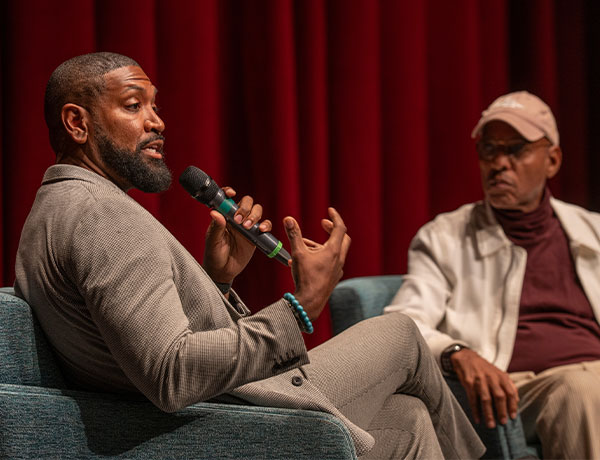
“We are outgunned! Outmanned! Outnumbered, outplanned!”
The rendition of “Right Hand Man” from Hamilton brought the crowd in Millard Auditorium to its feet. Clark, who played George Washington in the iconic musical starting in 2017, was there to speak on “Finding Your Purpose: From Baltimore to Broadway’s Hamilton” as part of the University’s Helen Rogow Distinguished Visiting Lecturer Series.
“Your passions will lead you to places beyond your wildest dreams,” Clark said. “I've met presidents with this passion. I've become the person I wish I saw as a child with this passion. But the passion alone is not as fulfilling as when you know why you're doing what you do. So it's worth slowing down a little bit and remembering, ‘What is it that I'm passionate about? When I was a kid, what were the things that I just naturally loved to do?’ Your compass is there.”
In his wide-ranging and inspiring talk, Clark touched on lessons from growing up in Baltimore, where his father struggled with drug addiction. In his teenage years, singing in a gospel choir and developing an interest in performing helped him find his voice.
“The arts are a powerful thing,” he said. “As a species, storytelling is truly the oldest form of technology we have. When the arts are neglected and attacked, the world gets sick. Civilizations have a decline in culture and health.”
Before his role in Hamilton, Clark starred as Marvin Gaye in Motown: The Musical, and he’s gone on to other roles in theatre, film, and television. In the Q&A session moderated by Kevin Ramsey, the director of the theatre division at The Hartt School, Clark fielded a question from the mother of a 10-year-old aspiring performer, who asked how Clark would encourage young people just starting out.
Clark addressed her daughter directly: “Do what you love, exactly where you are. Start doing your gift where you are and it will just open doors.”
It was a note Clark also sounded earlier in the day in a masterclass for students at The Hartt School. As he led the students in a series of acting exercises, Clark shared stories about his first steps toward Broadway success.
“I thought musical theater was corny,” he said, “and then I saw Rent and it changed my life. I started skipping school to find auditions, and I got callbacks, and at the last callback they were like, ‘How old are you?’ And I said, ’17.’ And they said, ‘Come back in a few years. You’ve got something.’”
Clark also answered the students’ questions about the art—and business—of performing. One asked him how to stay true to one’s art in such a highly competitive field.
“You’re going to find in the beginning that you’re trying to define yourself for other people,” Clark said. “It’s a part of the journey. At some point you’re going to go, ‘I’m going to just be me,’ and then it’ll just work. Your job is to consistently be who you are.”